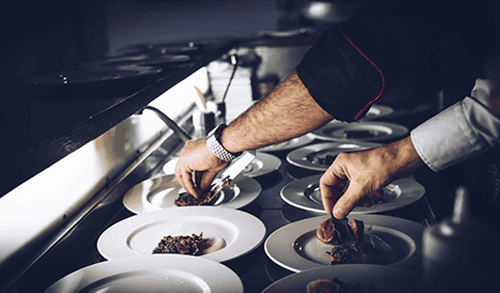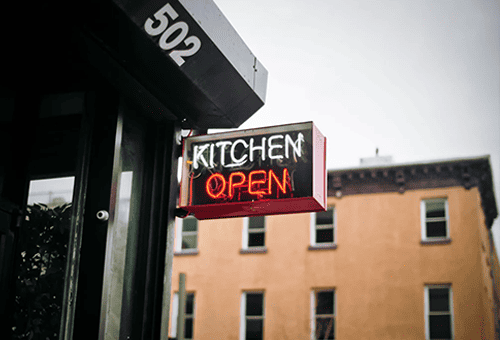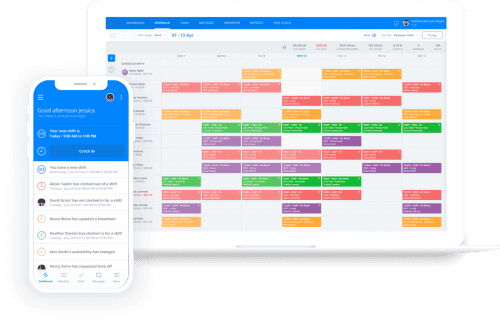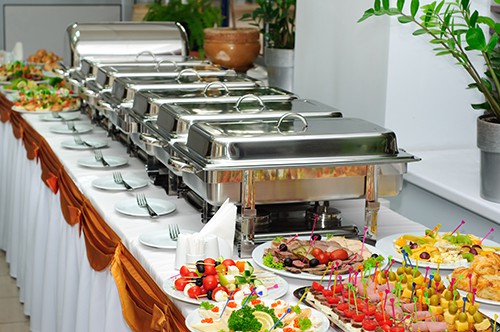How To Start an Event Planning Business: Step-by-Step Guide
Want to learn how to start an event planning business? Discover the steps to hel...

So you want to start a catering business? That’s great! The catering industry is ripe with potential and profit.
You can be a part of this wide-open market. All it takes is a love for food and a bit of hard work.
To help you get things cooking, we discuss some of the more important steps for how to start a catering business.
Along the way, we’ll address such issues as:
We’ll also discuss financing (to make it all possible) and advertising and marketing (to keep it all going). But before we get to those important issues, let’s investigate some vital steps that many potential caterers miss altogether.

Before you jump directly into registering your company and purchasing equipment, take a bit of time to envision the work-life balance you want to achieve through your catering business.
In other words, analyze your priorities and then formulate a picture in your head (or on paper) of what you want your personal life and your work life to look like when your catering business is up and running.
Do you need time to take care of your kids or your family? Do you only want to work mornings or evenings? Would you prefer not to work weekends?
In addition, give some thought to other questions, including:
Asking and answering these types of questions — and painting as accurate a picture as possible — can help you decide whether learning how to start a catering business is the right path for you or if you’d be better suited working as a team member in an existing company.
The best way to figure out if you want to start a catering business is to work in one for a while. You’ll gain valuable experience in such foundational business practices as:
The lessons you learn can be directly applied to the catering business you start.

One of the unique aspects of the catering business is that it can be done anywhere. Yes, you’ll need cooking, storage, and transportation equipment, but all those things can be assembled at your home or in a street-facing storefront.
There are benefits and drawbacks to each, but you can always move from your kitchen to a storefront when you’re more established. Plus, starting a catering business in your home can help to keep overhead low while you get things going.
Health codes for the foodservice industry are extensive and can differ from state to state and city to city.
You may be surprised at just how many rules and regulations there are for handling, cooking, storing, and transporting food. And don’t forget requirements like periodic inspections and food-grade equipment.
Learning about the health codes that apply to the catering business can help you decide whether to move forward or find another dream.
Every business needs a plan, and a catering business is no different. Your business plan should contain the following information:
The details you include in your plan will help you secure funding (if necessary) and show you exactly what you need to do to get your catering business off the ground.
Start thinking about business names for your catering company as soon as possible in the early stages of your planning and preparation.
It can be difficult to come up with something that isn’t already being used by another business, so it might take you some time to come up with an acceptable moniker.
Keep in mind that good business names are often easy to remember and leave potential clients and customers with no question that your company offers catering services.
So, for example, choosing something descriptive like Jane Public Catering & Events is much better than something vague like Jane Public, LLC.
You’ll need to settle on a name before you can move to some of the steps in the next section (e.g., registering and licensing your business and opening a bank account) because you’ll have to include the choice on any paperwork you fill out.
Once that paperwork is complete, making changes can be time consuming and expensive. You can avoid these difficulties completely by settling on a name before you start filling out paperwork for your business.

Writing out your business strategy is a great way to motivate yourself to keep thinking about the overall process of starting a catering business and what you want your particular operation to look like.
Your strategy doesn’t have to be a lengthy endeavor (at least at the beginning), so consider focusing on business-level strategy at this point.
As your catering business grows, you can always amend things to implement and include other information, such as organizational strategy, corporate strategy, and functional strategy.
Catering businesses carry a lot of risks: from fires and food poisoning to transportation accidents and employee injury.
If you’re operating your business as a sole proprietorship, you could be liable for any damages. That means the law could come after your personal property to settle any debts.
You don’t want to lose your home over something that happened to your business. Consider forming a legal entity for your catering business (e.g., a C Corp, S Corp, or LLC) so you’re protected from anything that might happen on the job.
Make sure you speak with an attorney for complete legal guidance when getting your catering business off the ground.

You’ll also need to get a business license in order to operate legally in your state or city. Keep in mind that the license to operate in one city doesn’t necessarily mean you can operate in another city.
If you are catering an event outside your usual location or in another part of the state, you may need to obtain a separate license. Inquire at your local courthouse, and they should be able to tell you exactly what license(s) you’ll need.
Again, your attorney will know what to do.
A big part of learning how to start a catering business is getting to know your target market (i.e., the customers you want to serve).
For example, you may want to focus on catering for business functions. That target market will have different requirements than, say, catering for weddings.
Because of that, doing a bit of research before you open your doors can provide valuable insight into things such as:
With data like this in hand, you’ll be better positioned to make your catering business as attractive as possible to potential clients.
Before you can “open your doors” and start catering events, you’re going to need to secure financing. Whether you need money for kitchen equipment, freezers and warmers, or a van for transportation, the financing will have to come from a bank or investors.
You can also look into government programs and grants designed especially for small-business owners.
Regardless of the legal entity you choose for your catering business, it’s a good idea to keep your personal and business assets separate. That means opening a business bank account for any and all income and expenses you incur along the way.
Doing so will things much easier along the way, including:
As you did with getting incorporated and licensed, be sure to talk to an accountant or tax professional about the type of bank account that’s right for your catering business.
At first, you may not know exactly what expenses you may have — you’ll know the big ones, for sure, but you may also have to factor in things like stamps, business cards, rags, and name tags.
To keep yourself from overspending, build a budget so you’re ready for when things really take off. Do your best to stick to that budget, but don’t be afraid to revise things along the way to make room for unplanned expenses.

The catering business can be an equipment-heavy endeavor.
You’ll almost certainly need quality cookware and appliances to do the job right — and remain in compliance with health and safety guidelines — not to mention a way to transport your fare to the customer’s venue.
Once you’re through the planning and preparation phases, it’s time to purchase the equipment your business will need to produce its product.
Much of this equipment may be expensive, so consider buying used or leasing the larger items from a reputable company.

If you’ve never run your own business before, hiring employees may seem like a daunting task. Start by writing an effective job description to post online or in your local paper. When you find someone with potential, follow this three-step procedure:
And don’t feel like you have to hire 10 employees at first. Many catering companies have started out with just two people—a chef and a server—before expanding the size of their team.
Whether you have one employee or 100, you’ll need to give some thought to how you’re going to schedule your staff. Ask yourself these questions:
The answers to a lot of those questions will depend on when during the day (or night) the majority of your events occur.
Once you have a handle on the type of schedule your catering business needs to succeed, use employee scheduling and time clock software, like Sling, to make this difficult task super simple.
If you’re committed to running a catering business, you may want to get started advertising and marketing right away. Consider starting with a website. Research restaurant websites, and use what you find there to create your own effective online presence.
After researching, advertise your fledgling business through word-of-mouth, flyers on telephone poles, or whatever guerilla marketing tactics you can think of. Keep in mind that it may take a while for your first client to contact you.

Once your business gets going, you and your employees are going to need access to technology that makes the job easier.
Software that provides such things as a mobile time clock, communication features, scheduling, task management, and more can streamline the workflow and help everyone perform at their best when they’re on the job.
Customers are the lifeblood of your catering business so you want to treat them right no matter the circumstances.
Encourage everyone on your team to provide the best customer service possible at all times and then back it up with the best possible product your business can manage.
If customer service is the heart of your catering business, the product you offer is the soul. That includes everything you do from the place cards you set out to the uniforms your team members wear when they’re on the job.
Think about creating the best experience possible for customers and diners alike and you’ll be on the way to catering success.

All of the things you do before you get your first catering job set your business up for success or failure. If, for example, you choose not to get experience in the industry, skip making a business plan, and forego a budget to manage your money, you may run into problems down the road.
In fact, the steps you take in the Get to work section rest squarely on the results of the previous steps on the list.
Think of learning how to start a catering business — or any business for that matter — like building a skyscraper. The entire edifice rests and depends on factors you can’t necessarily see (e.g., the foundation, the materials used, and the underlying support structures).
If your catering business’s foundation is weak for some reason, the entire thing could come crashing down at the first signs of stress.
But if your catering business’s foundation is strong, it may be able to weather the storms that threaten to knock it down.
So, do your best to be patient and work your way through all the research, planning, and preparation that goes into starting a business.
The knowledge you gain in the process can become invaluable for helping you make your catering business a long-term success.
You may be tempted to “go big” right from the start. That may not be necessary. Begin by catering a friend’s birthday party or your significant other’s business lunch. Gain some experience, take on larger events, and expand and build from there.
Taking it slow doesn’t mean you’ve failed; it just means that you can see the potential pitfalls of getting too big too fast and want to avoid them. Remember, running a successful catering business is a marathon, not a sprint.

As we mentioned earlier, making use of modern workforce management technology can help you get your business off to the right start.
The Sling app, for example, gives you the power to organize, manage, and optimize your workforce with powerful tools such as:
Try Sling for free today to get a better idea of the many ways it can help you learn how to start a catering business on your own and make it a success.
Then, for further business management resources and help scheduling your employees, visit GetSling.com today.
See Here For Last Updated Dates: Link
This content is for informational purposes and is not intended as legal, tax, HR, or any other professional advice. Please contact an attorney or other professional for specific advice.
Schedule faster, communicate better, get things done.